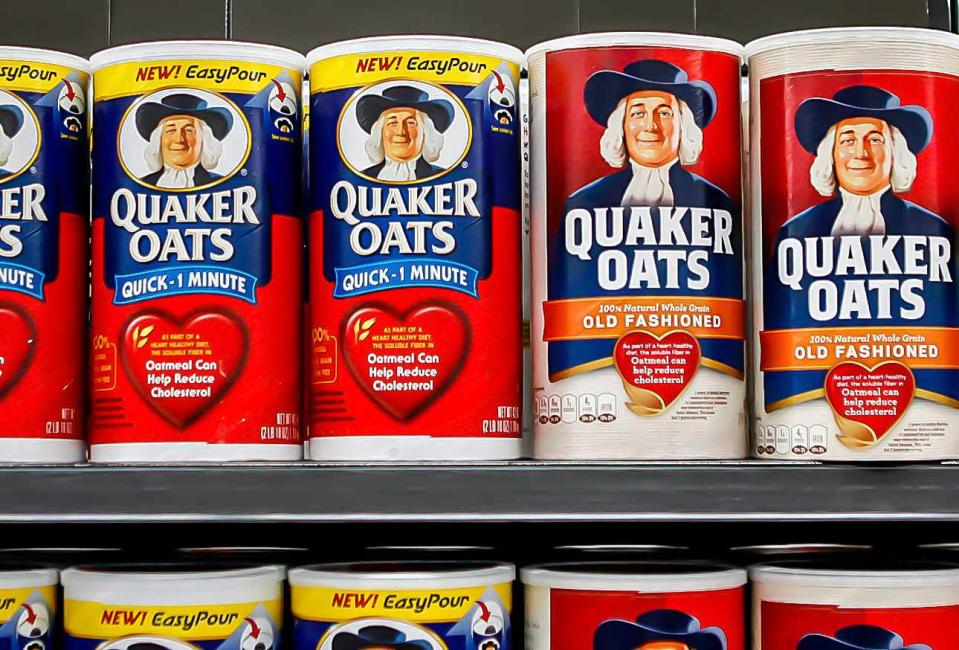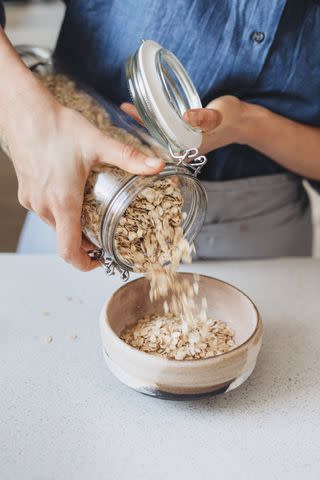The Only Way You Should Store Oats, According to Quaker Oats
Yes, there's a right way, and here is what the experts say.

Simply Recipes / Getty Images
I am a proponent of the many benefits of oatmeal—it’s versatile and keeps me full for longer—so I am thoughtful about eating more of it. I will always welcome a sweetly spiced oatmeal cookie as a treat or a nice bowl of steel-cut porridge loaded with cinnamon, sugar, milk, and a banana, especially during cold winter days.
When it comes to storing my oats, however, I am a bit lax. I keep it in its original packaging, stick it in the cupboard, and use it when the mood strikes. Lately, I’ve been trying to do a better job of keeping my groceries fresh for longer once I bring them home. So to learn how to store my oats, I scoured the internet to see what the experts had to say, including Quaker Oats.
Here’s what I learned.
The Best Container for Storing Oats
There are several types of oats, like rolled or old-fashioned, instant, steel-cut, and Irish, and they come in a variety of packaging such as tins, cardboard cylinders, and plastic and paper bags. While you can certainly keep the oats in the same containers they came in, once you open them it is best to transfer the oats into an airtight metal or glass canister. Oats stored in non-porous containers will last longer.
Once the packaging has been opened, exposure to air can decrease the timetable for how long your oats stay fresh. Moisture and yeasts can cause your oats to turn rancid, and unwanted pests can get into them. This is especially true if the oats come packed in paper—air and moisture can make the oats turn rancid.
The Best Place To Store Your Oats
Quaker Oats’ take on where to keep your oats is: “We recommend storing all grain-based products in a clean, cool, and dry location.” This means you should avoid direct sunshine, heat from the stove, oven, or other appliances, and moisture of any kind.
This could apply to several places in your kitchen, like in a closed cupboard or pantry. If the oats are in an airtight container, you can also put them in the refrigerator or freezer for longer storage.
What the Best-By Date Actually Means
Your package of oats will have a “Best If Used By/Before” date stamped on it. When it comes to Quaker’s products, if that date passes, “the product is still safe to eat, but the product's quality may decline, and you might notice a change in texture or flavor.”
According to the USDA’s Food Safety and Inspection Services, a “Best If Used By/Before” date isn’t a purchase or safety date. It’s simply reflecting the optimal time for a product’s freshness. Therefore, use your best judgment to know if it’s time to discard them: the oats should not smell or taste rancid, and you should not see any visible signs of mold or rot.

Simply Recipes / Getty Images
How Long Do Oats Last?
While the “Best If Used By/Before” date on your oats package is a good gauge, if you store them properly, they will keep a bit longer. The USDA states that if unopened and stored in the pantry, uncooked cereals and oatmeal can last between six and 12 months, and for three months once opened.
The oats can be transferred into an airtight metal or glass canister and stored in the refrigerator or freezer to prolong their shelf-life.
How To Tell If Your Oats Have Gone Bad
There are plenty of ways to tell if your oats have turned rancid. Mold can accumulate on the grains, so keep an eye out for growths and discolorations. As for smell, spoiled oats will have a noticeable sour odor. Sourness in the flavor of the oats is also one surefire way to tell you they’ve gone bad.
The Takeaway
As soon as you open your oats, transfer them into an airtight container. Store them in a cool, dry, and dark place like a closed pantry, or your fridge or freezer. You can eat oats past their best-by date, but check that they haven’t turned rancid, for mold, or pests. Generally, if stored in the pantry, you can keep an unopened package of oats for six to 12 months, and three months if opened.
Read the original article on Simply Recipes.

 Yahoo Sports
Yahoo Sports 